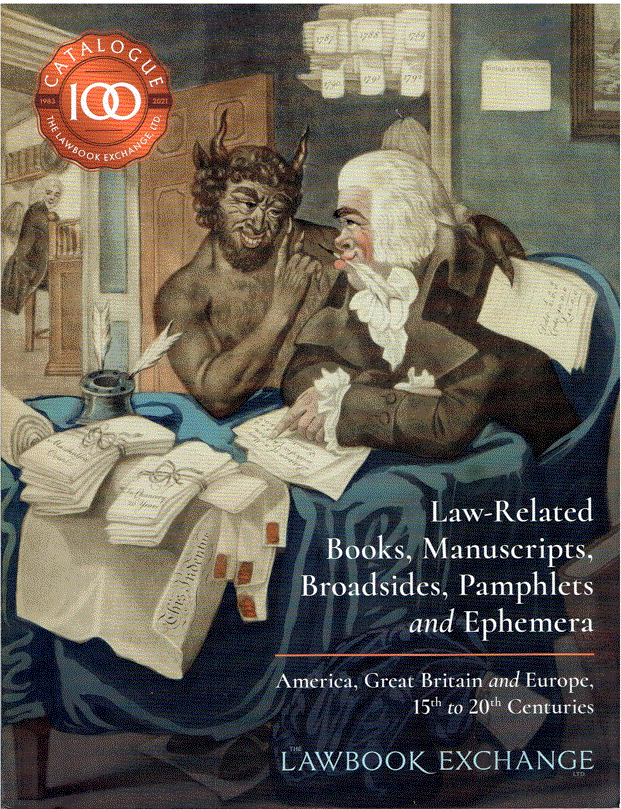Law-Related Books, Manuscripts, and Ephemera from The Lawbook Exchange
- by Michael Stillman

Law-Related Books, Manuscripts, and Ephemera from The Lawbook Exchange
The Lawbook Exchange has issued a catalogue of Law-Related Books, Manuscripts, Broadsides, Pamphlets and Ephemera (America, Great Britain and Europe 15th to 20th Centuries). This one is a milestone for the law book seller and publisher. It is their Catalogue 100. There is much of legal interest here, from the technical works of lawyers to the scandals that make their way into the court system. If it pertains to the law, it can be found here. These are a few samples from this milestone accomplishment.
Benjamin Cardozo was one of America's most important jurists, and his influence remains as significant today as in his time. He saw the law as a living, evolving set of ruling principles, not something fixed in its time, unable to adjust to meet the current, changed times. The idea is at the heart of the debate between liberal vs. conservative jurisprudence today. His ideas are described in his book, The Nature of the Judicial Process, published in 1921. The Lawbook Exchange describes it as “one of the most important legal works of the twentieth century.” This is a special copy as it comes from Cardozo's personal library. His friend and executor, Judge Irving Lehman, commissioned a bookplate to mark those books he received from Cardozo's estate. Item 33. Priced at $5,000.
This next book had a profound affect on Thomas Jefferson and America's founders. It is of such importance that it was listed in the compilation of the most important books of the western world, Printing and the Mind of Man. Still, most Americans probably do not know his name. He was Italian, Cesare Bonesana de Beccaria. Item 4 is his An Essay on Crimes and Punishments, the first English edition of a book originally published in French, from 1767. It was the founding book of modern criminology, advocating for a more humane and utilitarian system of penalties, rather than the focus being on revenge. He opposed the use of torture, then (and still today) used to gain confessions, as well as the death penalty. He wanted penalties to be designed to positively alter behavior, making the world safer for everyone. He opposed unequal sentencing and the use of personal connections, also rampant then and still today. Item 4. $3,750.
Here is another progressive work in penology from an Italian writer. This one is De Sortilegio et Magia by Filippo Renazzi, published in 1792. Renazzi was an Italian jurist and in this work he pushes for the decriminalization of witchcraft and magic. Fortunately, these barbaric practices, unlike some Beccaria sought to eliminate, no longer exist in America and the West, America having learned its lesson in the Salem witch trials a century earlier. Elsewhere in the world, strange practices continue to this day. Item 113. $2,500.
You may be wondering about the illustration on the cover. That is a broadside entitled A Lawyer and His Agent. You might have guessed it's not very complementary of the legal profession. It was created by Robert Dighton (Sr.) and printed in 1795. His agent, aka Satan, is advising the lawyer on perpetuating long delays in his suits, constantly stalling and filing more papers for which he can bill his clients. I never thought of this as intentional, but it is certainly true that legal proceedings tend to drag on endlessly, all the while racking up bills. Those piles of paper in the drawing are documents from long-running legal proceedings that take forever to conclude. So much paperwork. I guess the devil is in the details. Item 46. $2,500.
Item 124 is Report of the Trial of Samuel M. Andrews, Indicted for the Murder of Cornelius Holmes. The case was from Massachusetts in 1868. They were close friends for a long time, but Andrews beat Holmes to death with stones. He argued insanity and self-defense. He claimed he was fighting off Holmes attempted act of sodomy. Perhaps Andrews would have elicited more sympathy to his defense were it not for one fact. Holmes had named Andrews as his heir in the will. The jury didn't entirely believe Andrews. They accepted the claim of an attack, and consequently did not find him guilty of murder, but felt his violence toward Holmes was unnecessary. He was found guilty of manslaughter and was sentenced to 20 years. $450.
Here is another murder case, a pamphlet of an axe murder which The Lawbook Exchange notes without irony is “stab-stitched.” The title is The Hunter-Armstrong Tragedy. The Great Trial. Conviction of Benj. F. Hunter for the Murder of John Armstrong. Hunter invested in Armstrong's music publishing business, but lost $7,000. He came up with a plan to turn his losses into profits. Hunter insured Armstrong for $25,000, with an accomplice enticed Hunter into a meeting, and smashed him with an axe. He put another man's initials on the ax to transfer suspicion to him. Though he remained unconscious, Armstrong survived, leading Hunter to go to his sick bed and tear off his bandages. The accomplice confessed, Hunter was convicted and hanged. Item 131. $850.
The Lawbook Exchange may be reached at 732-382-1800 or law@lawbookexchange.com. Their website is www.lawbookexchange.com.